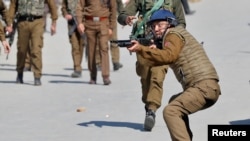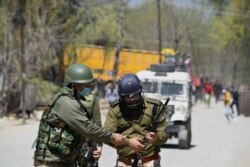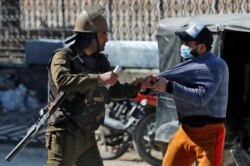When word gets out of a gunfight between security forces and separatists in Indian-controlled Kashmir, the media are quick to respond.
"All it takes is a call from sources," said Qisar Mir, a photojournalist in the state's Pulwama district. "The moment I get a confirmation, be it any time and weather, I have to immediately rush to the spot and cover the gunfight."
But that could change after the police chief in India-controlled Kashmir told media to stay clear of clashes, citing safety and national security risks.
The ban centers on coverage of what is known as a "police encounter" — a gunfight between regional police or armed forces and separatist militants. Some rights groups have criticized the clashes, describing them as "extrajudicial killings." Often, security forces cordon an area believed to contain militants before zeroing in and using ammunition and mortar rounds to kill the separatists.
The remarks by Kashmir's police inspector general, Vijay Kumar, would prevent media from covering these clashes live. Instead, a district senior superintendent of police would brief journalists on what took place.
Kumar's remarks were made during a news conferences, during which he said media should keep their distance and not carry live coverage.
"The freedom of speech and expression is subject to reasonable restrictions. They should not violate other people's right to guarantee life or put national security in jeopardy," Kumar said at a news conference.
The police chief said media put their lives in danger by covering events live, warning they could be hit by a stray bullet. He warned against coverage "likely to incite violence or which promotes anti-national sentiments."
Jammu and Kashmir police did not respond to VOA's emails requesting comment and further details.
While safety is an issue — journalists have been injured reporting on the clashes — the police chief's remarks unsettled media in the India-controlled region, who warn it could prevent journalists from performing a vital watchdog role.
Moazum Mohammad, vice president of the Kashmir Press Club, told VOA he believes the move is a deliberate attempt to restrict media from covering facts on the ground and could jeopardize the public's right to know.
"The diktat is aimed at restricting journalists from doing their jobs," Mohammad said. "There are limitations on live media coverage of counterinsurgency operations which journalists can't ignore and have to abide."
While acknowledging that states have a responsibility to maintain law and order, Meenakshi Ganguly, South Asia director at Human Rights Watch, said the restrictions could prevent media from performing an important watchdog function.
Because of repeated allegations of extrajudicial killings or excessive use of force during police encounters, independent oversight is important, Ganguly said.
"The media has operated under extremely [challenging] circumstances [in Kashmir] for decades, under pressure from state agencies, armed groups or political actors to present only their side of the story," Ganguly said. "However, the restrictions that the media faces now, including often threats of arrest or attack, is particularly alarming."
Several restrictions and media laws have been introduced in the India-controlled region since Prime Minister Narendra Modi rescinded Article 370 in 2019, which granted autonomy to the disputed territory. Reporters risk arbitrary arrest, fines, harassment or beatings.
Authorities cite national security risks or inciting of militant groups as the reason for the laws, internet bans, or arrests.
The region is often the site of clashes between Indian forces and militants, who want a separate state for the Muslim-majority region.
But media rights groups say authorities should not be trying to control coverage.
Gunfights in a conflict zone are a matter of public interest and police should not dictate what reporters can or cannot report on, said Aliya Iftikhar, senior Asia research at the New York-based Committee to Protect Journalists.
The police chief's remarks are "yet another attempt to control the narrative around Kashmir and the press," Iftikhar told VOA.
Mohammad, of the Kashmir Press Club, said that covering the news live is important in helping stem the flow of false rumors and unverified information, which has potential to trigger chaos in Kashmir.
"The government has been insisting that Kashmir is being projected falsely by media and this new advisory will further aggravate that position in the face of lack of credible and authentic information," Mohammad said.
His point has been echoed by other prominent journalists in the region, including Anuradha Bhasin, executive editor of the Kashmir Times.
"Journalists cover encounters for facts, information (vital in a democracy). It is a call to duty. Stop 'interfering' in that!" Bhasin tweeted.
Journalists covering unrest or police responses in many Kashmiri districts already face obstacles, with many saying they are harassed regularly by security forces. In some cases, police order them to hand over footage or confiscate equipment.
In March, photojournalist Mir, who contributes to the regional network TV9 Bharatvarsh, was harassed while covering a clash in Kakapora, Pulwama. Police pointed a pellet gun at the journalist and another kicked and chased Mir.
The police announcement has prompted 12 journalism organizations to issue a statement asking Inspector General Kumar to clarify his comments.
"If this is a part of the official policy of police, then it appears to be a tactic to coerce journalists into not reporting facts on the ground," read the statement signed by the Kashmir's editor's guild, press club and other groups. "It also seems to be a part of the string of measures taken by the authorities to suppress freedom of press in the region."






